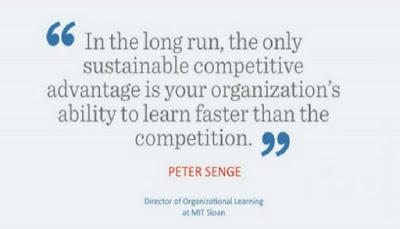A phrase that is appearing more and more in the spotlight, especially in the corporate realm, is the "
learning culture". A growing tension is occurring in business organizations in regards to how employees may be engaged to be stakeholders in the health and advancement of business organizations. This tension is driven by the face off between the training culture that has been in place since businesses first opened shop with the intent by leadership that someday the apprentices of that business would carry on and teach the skillsets to the next generation versus a new generation born into a world where technology is advancing an exponential rate and that technology is merging into all layers of life and has made itself irreplaceable. The obvious example would be the cell phone which has evolved into the smart phone. More than just a simple communication device, it has become an essential to linking people up to all the necessities of digital life. To see how dependent we are on such a device, consider the human reactions that are displayed if access is suddenly cut off for a lengthy period of time.
 |
| Credit: www.ibdaahub.com |
In order to cope and adjust to the emergence of technology means that human beings have to exert effort to learn how to use and integrate the technology into their daily lives. This means that learning is not limited to the four walls of the business organization in training sessions but learning needs to be available 24/7, using any device, and available anywhere. This is the requirement of living productive lives in the digital world.
Corporate Training: Putting a Square Peg into a 21st Century Round Hole
An obvious but important question that needs to be asked is:
"Why doesn't the old training paradigm deliver anymore the way that it has always done in the past?"
A simple answer would be that the world changed and is changing faster than business expected or had even planned for.
 |
Credit: www. Biz Library.com
|
A natural reaction when confronted by rapid change that could impact your business livelihood and that of your employees is to freeze in your tracks and retreat back into what was comfortable. This retreat is a double-edged sword because while it may feel comfortable, the changes with the opening up of the collaborative, networked, global economy means that those who are not use to this constant change are being quickly left behind. Past clients and opportunities disappear and join forces with competitors who have learned that in order to increase the ROI, their organizations need to have employees who have developed the necessary skillsets to work on the world wide web.
 |
| Credit: David Blake |
With respect to the traditional training sessions involving the "
sage on the stage" with his or her multitude of Powerpoint slides, this just does not cut it if the performance goals are based on in house learning alone.
"It is important to remember that the training culture has its roots in the industrial age which is long past. The age of learning, technology and innovation works on a new set of parameters. The differences between the training culture and the newly evolved learning culture are becoming starkly apparent."
On a basic level of comparison, the following would apply:
 |
| Credit: Vikas Tyagi (2013) |
In comparing the above parameters it can be deduced that there has been a shift from organizational needs to employee needs. Why? The answer lies in the need of an organization to empower employee engagement in an age where personal learning and collaboration in a networked world are the key elements to innovation which is the key to competing in a globally connected digital economy.
 |
Credit: David Blake
|
If training culture no longer fits the needs of 21st century business, what other evidence supports such a radical conclusion. As we piece the evidence together, we start to see how advancing technology and the explosion in new knowledge is giving shape to a new type of learner who become employees and leaders.
 |
Credit: www. Biz Library.com
|
 |
| Credit: David Blake |
In this post you will notice that I have not attempted to "train you" but instead to get you to think about your own business organization in the context of the globally connected digital economy. In Part II of this post, I will detail more as to what an effective learning culture in business should look like. I do leave you with the following question:








No comments:
Post a Comment